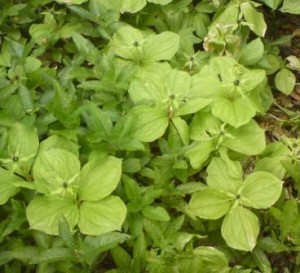 Skunk Cabbage is, I am reliably informed, the strange looking plant I showed a picture of last month. This month’s unusual plant picture is here, I discovered what it is quite recently, it is quite rare and grows in this parish, but I wonder how many others know it?
Skunk Cabbage is, I am reliably informed, the strange looking plant I showed a picture of last month. This month’s unusual plant picture is here, I discovered what it is quite recently, it is quite rare and grows in this parish, but I wonder how many others know it?
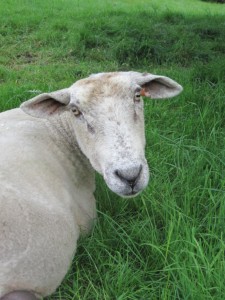 My next exhibit is an old friend who was born in 2004, and was reared as an orphan, she was born in the year that the theme for orphan names was ‘confectionery’, and her name is Yorkie. I show her picture because apart from being a strong and greedy character, she had triplets this year, being her sixth crop of lambs. She appeared last month, before she lambed, doing a barrel impression. It is unusual to be able to track a ewe from year to year, as they tend to lose their identities quite quickly It is easier with tame ones though, their behaviour gives them away, and allows us to have a bit of fun on school visits, when children can get up close to them, feel their wool, and feed them toast. Unfortunately for Yorkie, her milk factory is failing, and one of her lambs had to be taken to rear as an orphan, it also seemed that she couldn’t count to three, so kept leaving the poor little hungry one behind. The good news is that the poor little hungry one is now the biggest and bounciest of our four orphans, and her name is Scrabble, the middle one, splattered with milk, in my next picture. If I said that the names of the others are Cluedo, Lottie and Connie, I wonder who could guess this year’s theme, and what each one is short for?
My next exhibit is an old friend who was born in 2004, and was reared as an orphan, she was born in the year that the theme for orphan names was ‘confectionery’, and her name is Yorkie. I show her picture because apart from being a strong and greedy character, she had triplets this year, being her sixth crop of lambs. She appeared last month, before she lambed, doing a barrel impression. It is unusual to be able to track a ewe from year to year, as they tend to lose their identities quite quickly It is easier with tame ones though, their behaviour gives them away, and allows us to have a bit of fun on school visits, when children can get up close to them, feel their wool, and feed them toast. Unfortunately for Yorkie, her milk factory is failing, and one of her lambs had to be taken to rear as an orphan, it also seemed that she couldn’t count to three, so kept leaving the poor little hungry one behind. The good news is that the poor little hungry one is now the biggest and bounciest of our four orphans, and her name is Scrabble, the middle one, splattered with milk, in my next picture. If I said that the names of the others are Cluedo, Lottie and Connie, I wonder who could guess this year’s theme, and what each one is short for?
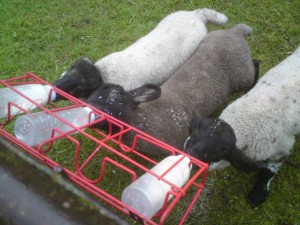 I suppose I should be the predictable farmer, and mention the weather, obviously all talk of drought went right out of the window the other Sunday, when we had 40mm in 24 hours, since then we have had a total of around 93mm in June, or a bit over 3 and a half inches in old money. This is more than we had in the four months from Feb 19th to June 11th, and that has put its indelible stamp on the fortunes to be borne out at this year’s harvest, I really haven’t a clue what it holds in store, the barley and rape look promising, but the wheat is a mystery, did it rain in time to fill the grain, and make up for the reduced number of ears due to tillers dying in the dry weather? I certainly can’t imagine that anything could stop the spring barley from being anything other than below average it looked so awful for so long.
I suppose I should be the predictable farmer, and mention the weather, obviously all talk of drought went right out of the window the other Sunday, when we had 40mm in 24 hours, since then we have had a total of around 93mm in June, or a bit over 3 and a half inches in old money. This is more than we had in the four months from Feb 19th to June 11th, and that has put its indelible stamp on the fortunes to be borne out at this year’s harvest, I really haven’t a clue what it holds in store, the barley and rape look promising, but the wheat is a mystery, did it rain in time to fill the grain, and make up for the reduced number of ears due to tillers dying in the dry weather? I certainly can’t imagine that anything could stop the spring barley from being anything other than below average it looked so awful for so long.
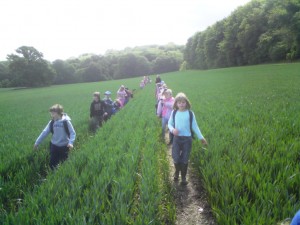 On a more cheerful note, we have been visited by a RSPB volunteer surveyor on three different occasions this spring, and he recently presented his findings. He was very pleased to find good numbers of interesting birds in the area he surveyed, centred around the main valley behind Haycombe. He identified between 30 and 40 different species on each of the three visits, and he was pleased to find particularly the Linnet and the Yellowhammer in good numbers on each visit. He commented that we have been very lucky to have been so deafened by Cuckoos this year, as this has not been so common across the area. Seeing that he records having seen Meadow Pipit and Dunnock on the farm, which if you read last month’s issue, you may recall are commonly used as hosts by the Cuckoo for their greedy chicks, can this be the reason for all the noise? Funny also to note that the Cuckooing largely ceased two or three weeks ago, long before the chicks would have fledged, which begs the question again: How on earth do they find their way across the Sahara without Mummy holding their hand?
On a more cheerful note, we have been visited by a RSPB volunteer surveyor on three different occasions this spring, and he recently presented his findings. He was very pleased to find good numbers of interesting birds in the area he surveyed, centred around the main valley behind Haycombe. He identified between 30 and 40 different species on each of the three visits, and he was pleased to find particularly the Linnet and the Yellowhammer in good numbers on each visit. He commented that we have been very lucky to have been so deafened by Cuckoos this year, as this has not been so common across the area. Seeing that he records having seen Meadow Pipit and Dunnock on the farm, which if you read last month’s issue, you may recall are commonly used as hosts by the Cuckoo for their greedy chicks, can this be the reason for all the noise? Funny also to note that the Cuckooing largely ceased two or three weeks ago, long before the chicks would have fledged, which begs the question again: How on earth do they find their way across the Sahara without Mummy holding their hand?
We have hosted several school visits in the last month, and never cease to be entertained by the cattle, Durweston Reception class took their lunch break last week whilst sitting in the trailer, and were amused by their audience, but who is the watcher, and who is the watched? The heavens opened shortly after this, and everyone had to rush to the left side of the trailer, only for collected water on the roof to gush over the edge when squally wind blew the tarpaulin upwards. The children took it very well!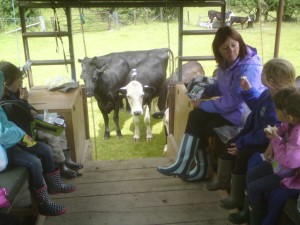
I spent several days last week chasing water leaks, always the bane of my life, we have 16 water meters on the farm, and countless water troughs and other usage points. This gives endless scope for drips, leaks and floods, and as every drop is metered, endless scope for huge water bills. Anyway, whilst digging away with a hired digger in the middle of a damp patch in the meadows, one of our steers decided he was bored and wanted a ride around the field in the trailer, so jumped on, his friends wanted to join in, but no one was brave enough.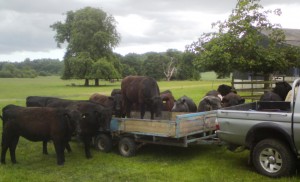
In the news this week there has been the RSPB led story about reduced subsidies to farmers for conservation. I am slightly perplexed by this, I think it is more a general point about how much value should be given to environmental matters in the new round of Common Agricultural Policy negotiations. The scheme that we joined last year, which pays for many acres of grass and wildflower headlands, pollen and nectar rich plots, and bird food strips, is a ten year commitment, and has taken around 65 hectares of cropping land out of production. (this could represent something like 500 tonnes of grain not being produced.) The debate opening up is really about how much effort should we devote to looking after our natural environment, whilst still trying to produce food for an ever hungrier world, in as efficient and sustainable a way as possible. It’s a bit of a juggling act. I am sure the Editor would love to print your comments on this next month.
Our new bull ‘Bonnington’ has been hard at work since his arrival last month, and I hope to release some pictures of this handsome beast, once they have been to the censors. We feed him a few nuts every day to keep his energy up, but he never seems to get to the end of his meal, because some frisky cow always comes along to distract him. With 50 attractive cows and heifers in the field, and 21 days between heats, that’s an average of 2.5 per day before any returns.
